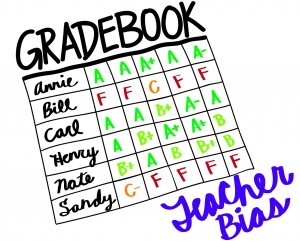Staff Writer
School revolves around grades. Though some may argue, grades help form your future. Typically, the better your grades, the better the university you are admitted into. The better the university, the better the career and thus the better lifestyle you are able to live.
Though grades are such a vital factor in a student’s life, they are not always fair. Some grading is based on the opinion of the teacher. For example, essays are graded without a precise standard. Each grader has a distinct preferred writing style, just as every student is a different type of writer. A student who receives a 70 on a paper from one teacher could receive a 100 from another teacher with different preferences.
Such variation in grading is related to a teacher’s bias as well. Some students have reputations as slackers while others are known as overachievers. Teachers are not unaware of this fact. If a student shows he or she cares about a high grade, teachers may be more willing to give them a higher grade. This does not grade the assignment; it grades the student.
It is often reputation and expectation that determines the final grade. Teachers have preconceptions of what a student’s assignment will be like. My friends and I have joked many times that if a teacher sees a certain name on a paper, either consciously or unconsciously, a certain grade will be given whether it deserves it or not.
Unfortunately, such bias creates a cycle. If a student has already built a reputation of slacking, a teacher will continually expect the work they turn in to be mediocre or worse. Even if the student attempts to work harder and become a better student, the bias from the teacher stands as a barrier. Even if the work the former slacker turned in could deserve an A, it is tainted with preconceptions. This leads to said student becoming discouraged, believing their efforts will amount to nothing – and therefore they return to slacking.
Bias toward a teacher could also affect grades. People who absolutely abhor their teacher do not try as hard in that class.
This sort of relationship also results in immoral decisions. Students feel as if they have the right to cheat or copy off each other on the justification that the teacher is incompetent. Thus they do not learn the material properly due to this bias.
Such bias is inevitable and goes both ways in the student-teacher relationship. There are always going to be star students who try their hardest and students who slack off. Even so, fairness is a too often neglected option.
Instead of putting names on assignments, teachers could adopt a numeric system. Each student could be assigned a number, unknown to the grader, to be put on the work. Therefore, when grading, there would not be any unfairness. The anonymity of the work would be lifted after the work has been graded in case the student or teacher would like to talk about the assignment and the resulting grade.
With such a system, each student would be given a fair chance. Student would also be graded purely on the work they turn in and not on favoritism or preconceptions. This way, when a grade is given, a student would truly deserve it.









